
'For at least a year before the summer of 2016, civilians and fighters in rebel-held East Aleppo prepared for a siege they believed was both avoidable and inevitable. Correctly, it turns out, they calculated that the opposition’s bankrollers and arms suppliers—the United States, Turkey, Saudi Arabia, and other “friends of Syria”—cared little for the well-being of civilians in rebel-held areas. Through the spring, contacts inside Aleppo prepared for the siege, expending minimal effort on appeals to the international community, which they assumed would be futile.
For all the world-weary resignation of the opposition fighters and other residents of rebel Aleppo, they have a well-earned pride in what they’ve done. They’ve maintained their hold on half of the jewel of Syria, and under withering assault, have cobbled together an alternative to Bashar al-Assad’s rule. “From the beginning of the revolution, we held Aleppo as the role model of the liberated city, that holds free elections, has an elected city council, and elected local committees that truly represent the people,” Osama Taljo, a member of the rebel city council in East Aleppo, explained over the phone after the siege began in earnest. “We insisted to make out of Aleppo an exemplar of the free Syria that we aspire to.”
Unfortunately, Aleppo has become an exemplar of something else: Western indifference to human suffering and, perhaps more surprisingly, fecklessness in the face of a swelling strategic threat that transcends one catastrophic war.
Now that Russia, determined to reestablish its status after the humiliating collapse of the Soviet Union, has pushed the United States into a humiliating corner and weakened that international order, it is raising the stakes. Either the United States will push back, or the disequilibrium will spread even further. In either case, many thousands more Syrians will perish. As Bassam Hajji Mustafa, a spokesman for the Nour al-Din al-Zinki Movement, one of the more effective, if violent, rebel militias influential around Aleppo, put it, “People have adapted to death, so scaring them with this siege is not going to work.” Those who remain in Aleppo echo this refrain again and again: The last holdouts have stayed out of conviction. It’s hard to imagine anything but death driving them out. “If Aleppo falls and the world stays silent, then that will be the end of the revolution,” Hajji Mustafa said.
In the end, Aleppo is not a story about the West; it is a cornerstone of Syria and an engine of wealth and culture for the entire Levant. Aleppo is the story of the willful destruction of a pivotal Arab state, a center of gravity in a tumultuous region in sore need of anchors. It’s a story of entirely avoidable human misery: the murder of babies, the destruction of homes, the dismantling of a powerful industrial and craft economy.
Perhaps, finally, Assad and his backers have gone far enough to provoke an American defense of that indispensable order that America helped construct.'
In the end, Aleppo is not a story about the West; it is a cornerstone of Syria and an engine of wealth and culture for the entire Levant. Aleppo is the story of the willful destruction of a pivotal Arab state, a center of gravity in a tumultuous region in sore need of anchors. It’s a story of entirely avoidable human misery: the murder of babies, the destruction of homes, the dismantling of a powerful industrial and craft economy.
Perhaps, finally, Assad and his backers have gone far enough to provoke an American defense of that indispensable order that America helped construct.'
This comment has been removed by a blog administrator.
ReplyDelete